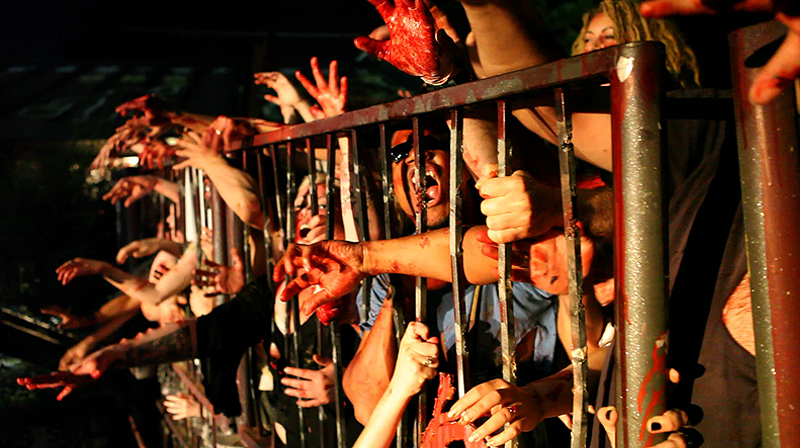Toward the end of the movie World War Z, Brad Pitt arrives in Jerusalem. By now, mindless zombies have overrun most of the world—but, thanks to a wall built by the Israelis, Jerusalem has been spared. The defenders have managed to keep out anyone infected with zombie-ism, preserving a space in which all—Israelis and Palestinians, Jews, Christians, and Muslims alike—are united against a common enemy. Just as Pitt comes on the scene, the survivors join to sing the Hebrew prayer, “May He create peace for us.” Drawn to the sound, the zombies climb up, one on top of another, until eventually they surmount the wall and tumble onto the singers below. Jerusalem, too, falls into the hands of al-Qaeda.
Well, not quite: nothing in the movie suggests an explicit identification of the zombies with Islamist jihadists. Still, the analogy is apt—and not least because many of today’s policy makers seem to have made such an identification on their own, conceiving of Islamic extremists in terms more appropriate to World War Z than to, for example, the doctrines and ideas of the Islamic State (IS). (That the anti-Israel cartoonist Eli Valley, in the New Republic, has reversed field by portraying Israelis as zombie cannibals is one of those predictable exceptions that prove the rule.)
Zombies make good horror-movie villains because they are mindless, flesh- and (in some versions) brain-eating creatures who can’t speak or even listen, and show no signs of rational thought. They just march around, usually in swarms, bent on a single aim: finding human victims into whom they can sink their teeth. How then to fight them? You can kill some, but there are too many of them; inevitably, you will be overwhelmed. Your best strategy is avoidance. Lie low and do nothing to draw their attention—lest, sensing your presence, they immediately converge on you and your friends.
Sound familiar? Example: the president of the United States, anxious in the aftermath of the Charlie Hebdo massacres to reassure “Islam” that America is “not at war” with it or anything related to it, instead refers to America’s Islamist enemies as “a bunch of violent, vicious zealots who behead people or randomly shoot a bunch of folks in a deli in Paris.” In a word, zombies. Another example: whenever someone in Israel suggests changing the status quo on the Temple Mount—where Jews are prohibited from praying at their religion’s holiest site while Muslims enjoy freedom of access—Israeli politicians and security experts rush to warn that doing so will lead to a religious war with the entire Islamic world: that is, as some Israeli public figures are at pains to specify, a billion and a half Muslims.
To think that all you need to do is yell, “that’s not Islam!,” and your Islamist foes will cease their war against you is, frankly, ridiculous. No less ridiculous is to believe that Muslims everywhere, fully a fifth of the globe’s population, will suddenly drop everything to wage a holy war over the Temple Mount—or that Israel is capable of sparking such a conflagration. Unless, of course, you believe that Muslims are zombies: do something, anything, that draws their attention, and they’ll come at you, uncontrollably.
Marie Harf, spokeswoman for the U.S. State Department , has said of IS: “We’re killing a lot of them, and we’re going to keep killing more of them, . . . but we cannot win this war by killing them.” More zombie thinking: in a zombie war, gun-wielding soldiers mow down hundreds of zombies only to be bitten themselves when they run out of ammunition. Harf’s solution: “We need, in the longer term—medium and longer term—to go after the root causes that leads people to join these groups, whether it’s lack of opportunity or jobs. . . . We can work with countries around the world to help . . . them build their economies so they can have job opportunities for these people.”
Most striking about these remarks is not Harf’s seeming ignorance of the fact that terrorists can be as rich as Osama bin Laden, as educated as his deputy Ayman al-Zawahiri (a physician), or born to privilege like Umar Farouk Abdulmutallab, the son of one of the richest men in Africa, who tried to blow up an American airplane in 2009. Nor is it her seeming ignorance of the fact that most of the world’s poorest countries are not, in fact, terrorist hotbeds. Most striking is that, like her president, Harf cannot admit the unsettling thought that something other than poverty and lack of opportunity draws people to these groups. Instead, the problem is purely technical. Find the right vaccine, administer it properly, and poof! no more zombies.
What neither Harf, nor her bosses in the State Department, nor the president will acknowledge is the role played by ideas and deeply-held beliefs. If you’re trying to figure out how to fight a ruthless, totalitarian, and ideologically-motivated enemy, you might look to the example of Winston Churchill, or George Kennan. If you’re fighting a zombie outbreak, you end up getting your answers from the latest episode of The Walking Dead.
To be fair, proponents of the zombie doctrine are not completely unwilling to acknowledge the power of ideas and ideologies in human affairs. (President Obama, for example, has theorized that racist beliefs are “deeply rooted” in American society.) Rather, their reluctance seems to kick in specifically when it comes to religion. Thus, strangely paraphrasing a favorite slogan of the National Rifle Association, the American president has asserted that “No religion is responsible for violence and terrorism; people are responsible for violence and terrorism.” Of the chieftains of IS and al-Qaeda he has said: “They are not religious leaders . . . they are terrorists.” Why not both at the same time? Evidently, to him, religion in general—or, if not religion in general, then certainly Islam in particular—is a kind of spiritual icing on the cake of life, not to be taken seriously as a motivating factor in anyone’s actions.
In some cases, that may even be true. But religion is also a powerful force capable of transforming the lives of believers and dictating their actions 24 hours a day, seven days a week—for better or for worse. Ignoring this fact, instructing Muslims about the precepts of their “real” religion, doesn’t explain why so many actually believe that IS and other radical extremist are true Muslims, or why some young Europeans—with or without jobs, opportunities, or broken systems of governance—join IS. And it sure as hell doesn’t explain how to stop them.
What, then, about Iran? After all, it calls itself the Islamic Republic; it has killed hundreds of American soldiers in Lebanon and Iraq; there’s scarcely an Islamic terrorist organization it hasn’t supported at one time or another; it currently backs Shiite militias in Iraq that are just as brutal as IS. So why hasn’t the U.S. applied the zombie doctrine to the ayatollahs? According to that doctrine, you can’t negotiate with zombies, yet Washington negotiates enthusiastically with Tehran. And why hasn’t the president declared that there’s nothing Islamic about the Islamic Republic, or accused Iran’s Supreme Leader of perverting Islam?
The answer is that, in the case of Iran, the logic of the zombie doctrine runs in the other direction. The Iranian government is willing to speak softly and sit politely through negotiations in Geneva; therefore, it can’t consist of zombies. If the ayatollahs aren’t zombies, it follows that they must be rational beings just like us. And since religion must be discounted as a motivating factor in their politics or in their diplomacy—or in their words—their very willingness to speak is more significant than what they actually say. After all, chanting “Death to America!” is just a ritual declaration, with no bearing on real life. The Islamic Republic’s ideas—and even its actions—must be ignored.
Here’s a hint to IS: start negotiating, say, a 30-percent reduction in beheadings in return for economic aid and diplomatic recognition and maybe you, too, can change from being zombies, to being “adversaries,” and thence to worthy partners with an important role to play in the stabilization of the Middle East.
Ideology alone does not govern human actions, but ignoring or dismissing it is foolish, dangerous, and often fatal. Some followers of IS may be brainwashed youth, but that does not make them zombies, either. After all, zombies lack the most important thing needed for brainwashing: a brain.
More about: Islamism, Politics & Current Affairs, Zombies








